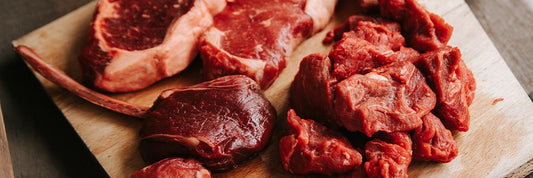ALL-NATURAL MEAT IS A SCAM

Our food system has a communication problem. At the most fundamental level, it should be easy and intuitive to understand what is in our food, how it was raised, and how it impacts the environment. From what I’ve seen and experienced, that’s not always the case.
As we peruse product packages at the grocery store, it can be challenging to understand the myriad differences between various certification standards and farming practices. But beyond parsing through the innate complexities of our food system, there are other, seemingly straightforward terms that simply don’t mean what we might think.
This is especially true regarding the vague and intentionally slippery meaning behind "all-natural" meats. At first glance, it would be reasonable to assume that "all-natural" suggests a certain standard for high-quality meat produced in step with nature. But as it turns out, "all-natural" isn’t nearly as natural as some would have you believe.
What “All-natural" Means — and What It Doesn’t
So how is "all-natural" meat defined? If you aren’t quite sure, you’re certainly not alone. Though it may sound relatively straightforward, most people — even food industry insiders — don’t fully understand what "all-natural" means.1
Furthermore, the majority of consumers think "all-natural" speaks to the quality standards or farming practices behind a given product.1 In fact, almost 50% of research participants in a recent food labeling study inaccurately interpret "all-natural" as an interchangeable term to describe foods produced according to organic farming standards.1 But, as you’ll discover, the reality is quite different.
So how do we define "all-natural" meat? According to the USDA, “all fresh meat qualifies as "natural" so long as it does not contain artificial flavors, chemical preservatives, or added ingredients (for example, spices).3 Amazingly, that’s it.
Far from offering any insight into how the food is produced, the term is so broad that it’s virtually meaningless. For example, a meat product can be labeled "all-natural" regardless of how the animal was raised, what it was fed, or whether it was treated with antibiotics. Furthermore, there are no standards, regulations, or guidelines farmers must adhere to in terms of their agricultural practices and approaches to animal welfare.2
In other words, "all-natural" meat can mean pretty much anything:

As you can imagine, the list goes on. That’s why it’s important to see through the "all-natural" sales-speak so you can find the products that actually meet your expectations.
The Adverse Impact of "All-natural"
Cheetos. Cookies. Fake juice sweetened with high-fructose corn syrup. Surprisingly, these are some of the countless "natural" food products that have proliferated in the past several years. It’s big business, and people are taking the bait.6 In fact, nearly three out of every four shoppers regularly purchase food items labeled ‘natural’, ultimately contributing to a market that’s expected to reach an astounding $300 billion by 2024.7
But this all comes at a significant cost. When you buy "all-natural" meat, in particular, you might be unwittingly supporting farming practices you don’t believe in. "All-natural" meats often come from large, industrial farms that largely utilize GMO feed. This in turn supports monocropping operations that are notorious for using synthetic fertilizers, pesticides, and other products that are known to destroy biodiversity, natural habitats, and soil health. It’s all connected — and all these issues come back to making informed choices about the meat you purchase, the farming practices you support, and the quality of food you put into your body.
The subtle deception of "all-natural" meat also erodes consumer trust. That’s because labeling food as "all-natural" can be simultaneously true and intentionally misleading. It’s called prevarication — and it’s working. In fact, a recent study found that 94% of people who purchase "all-natural" meat do so because they believe it’s better for their health, when in reality "all-natural" meat may be more likely to adversely impact consumers, livestock, and the environment.1
"LABELING MEAT PRODUCTS AS 'ALL-NATURAL' CAN BE SIMULTANEOUSLY TRUE AND INTENTIONALLY MISLEADING."
In an ideal world, food labeling would provide accurate, honest, and detailed information about what we eat. However, when it comes to "all-natural" meat, it’s equally important to consider what might not be present in your food. That's because "all-natural" meat products are generally raised in ways that make them less nutritious when compared to those produced through other, more holistic practices.
When animals are raised using regenerative agriculture principles, they actively improve soil health on and beyond the farm. This in turn supports the nutrient cycle, which is passed on through the meat these animals provide. In contrast, animals kept in enclosures and fed an all-grain diet can’t access or perpetuate the same nutrient exchange.
Trustworthy Standards: Believe in What You Buy
The "all-natural" product designation doesn't add up. At best, it's so vague as to be rendered completely meaningless. At worst, it's downright deceptive. This, however, isn't always the case across food labeling. Claim standards like "100% grass fed," "pasture-raised," and "regenerative" each provide specific and meaningful information about the food you eat, its impact on the planet, and how it nourishes your body.
There’s incredible power in knowing precisely where your food comes from, what went into producing it, and how it aligns with your values. It can take work and a healthy dose of patience, but the results are worth it.
For one thing, cultivating this knowledge will help you better understand and appreciate how the foods you eat can impact you, your body, and our planet — for better or worse.
In that respect, we owe it to ourselves and one another to see past the "all-natural" scam. This alone is a generative step towards a future where food transparency is the rule rather than the exception.
References
- https://midanmarketing.com/10-insights-about-todays-natural-and-organic-meat-consumers/
- https://newsroom.unl.edu/announce/beef/3039/17310
- https://www.fsis.usda.gov/food-safety/safe-food-handling-and-preparation/meat/beef-farm-table#11
- https://www.globalanimalpartnership.org/5-step-animal-welfare-rating-program
- https://www.cspinet.org/sites/default/files/media/documents/resource/food_labeling_chaos_report.pdf
- https://www.cbsnews.com/news/why-natural-is-one-of-the-most-meaningless-words-in-food-packaging/
- https://www.acosta.com/news/new-acosta-group-study-highlights-key-influences-for-growing-base-of-natural-and-organic-shoppers-reflecting-opportunities-for-brands-and-retailers









